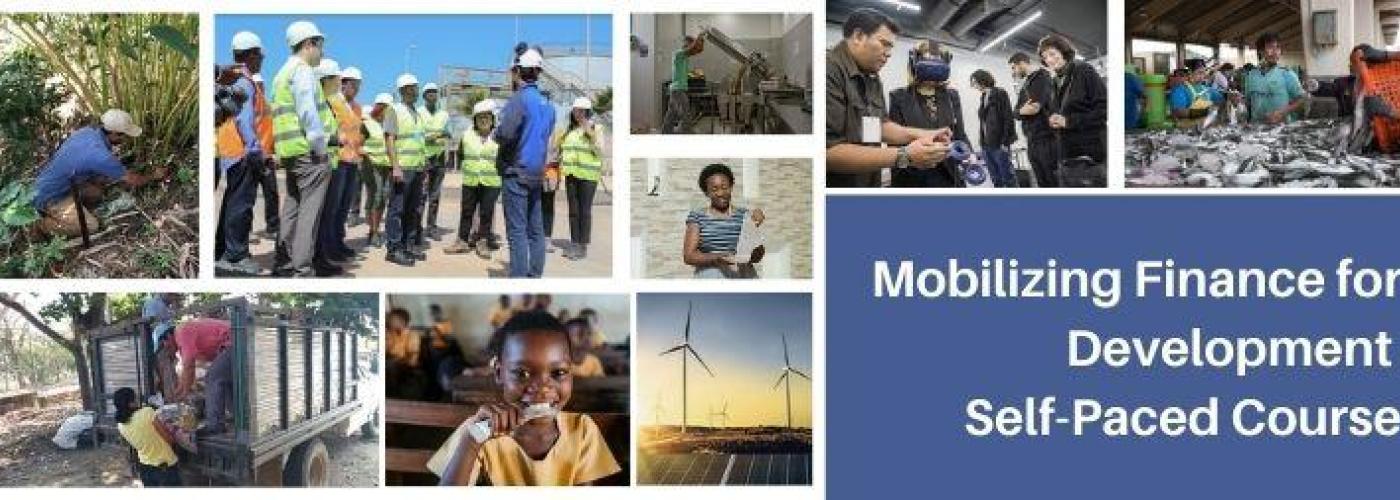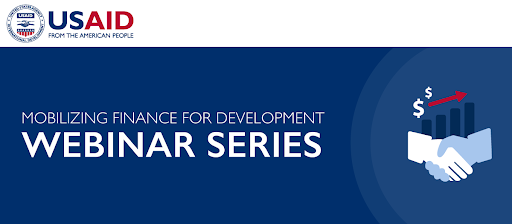USAID’s Mobilizing Finance for Development Course
Image

The rapid growth of private capital in emerging economies has created an unprecedented opportunity to catalyze financing for private sector-led investment. USAID’s Mobilizing Finance for Development (MF4D) self-paced course aims to equip both USAID staff and development practitioners with a fundamental understanding of finance and the tools and resources to mobilize capital investment for sustainable development outcomes.
This online course provides a wealth of information aimed at building a basic understanding of finance, and intervention points and tools that USAID and its partners can use to catalyze private finance to achieve their development goals. Participants will learn what development finance is and how financial markets and actors operate, as well as how constraints to finance in our partner countries can be mitigated and overcome.
The MF4D course:
- Offers an understanding of why mobilizing finance is critical to addressing development challenges in countries where USAID works
- Introduces the basic concepts of finance, key actors, and instruments
- Identifies constraints to finance
- Introduces tools, resources, and interventions that help overcome those constraints and catalyze development finance
Course Link: The MF4D course is available through the USAID Learning Lab, and is open to implementing partners, development practitioners, and private sector partners. (USAID staff can take the course through USAID University.)
For questions on the MF4D course, email, psetraining@usaid.gov. To learn more about USAID Private Sector Engagement, please visit our site.
MF4D Related Learning Events and Resources
MF4D Webinar Series:
Image

USAID is pleased to offer an ongoing series exploring how innovative financing solutions can be leveraged to address development challenges. Stay tuned for the next installment in the series.
Previous webinars:
Mobilizing Finance to Migrant Communities (and Beyond)
On October 27, 2022, the PSE Hub and Chemonics hosted "Mobilizing Finance to Migrants Communities (and Beyond)." This webinar highlighted key lessons from the Colombia RFI experience and explored how they overcame cultural misconceptions and structural barriers to reach Venezuelan migrant clients and mobilize $11 million in finance.
The webinar recording is available online. (Password: XwvPFZf3)
Related Blogs:
Financially Including Migrants, a Familiar but Unique Challenge
"Financially Including Migrants, a Familiar but Unique Challenge," Chemonics shares four key lessons learned through working with the USAID Colombia Rural Finance Initiative (RFI), and considerations to financially include migrants in programming.
Platform Work and Financial Inclusion: How Can the Development Community Extend Finance for Gig Workers?
On August 4, USAID's PSE Hub and Digital Team, in conjunction with the Consultative Group for the Poor (CGAP) co-hosted a webinar on "Platform Work and Financial Inclusion: How Can the Development Community Extend Finance for Gig Workers?" This webinar explored how the 'platform economy' is shaping livelihoods and how financial service providers are reaching gig workers. The webinar recording and post-event resources are available online.
Related Blogs:
"Financial Inclusion is Key to Fulfilling the Promise of Platform Work," CGAP's Gayatri Murthy shares why embedding financial services into digital platforms is pertinent to financial inclusion.
"Financial Inclusion, the Gig Economy and Digital Finance," by USAID's Lawrence Camp highlights how technology is disrupting traditional labor markets and creating new work opportunities for youth and other marginalized groups. The emergence of platforms is changing the nature of the gig economy.
"How can Embedded Financial Services Better Serve Platform Workers?" CGAP's Leena Datwani and Elizabeth Munee Kiamba shed light on the unique features and delivery mechanisms that platform-based financial services could offer platform workers.
"Realizing the Potential of Development Impact Bonds: Is the Verdict Still Out?"
On May 12th, USAID hosted the "Realizing the Potential of Development Impact Bonds: Is the Verdict Still Out?" webinar. This webinar highlighted development impact bonds. The webinar recording and post-event resources are available online.
Related Blogs:
"Are DIBs right for you?" Resonance's Elina Sarkisova poses five basic principles to consider when determining if a DIB is the right fight for your development projects.
“Enhancing Government Effectiveness - DIBs, a Valuable for a Much Broader Agenda,” Avnish Gungadurdoss and Ben Stephens of Instiglio discuss the potential of expanding adoption of development impact bonds (DIBs) for donors and development practitioners alike using an example from the Village Enterprise DIB.
“Development Impact Bonds: Innovative new development finance tool ...or overly complicated shiny new instrument?” USAID’s Priya Sharma, Jonathan Ng, and Lawrence Camp explore the pros and cons of using development impact bonds (DIBs) and highlight lessons learned since the launch of the Agency’s first DIB in 2014.
"Are DIBs right for you?" Resonance's Elina Sarkisova poses five basic principles to consider when determining if a DIB is the right fight for your development projects.
Promoting Gender Equity Through Finance
On February 24, USAID co-hosted the "Promoting Gender Equity through Finance" webinar. This webinar explored how gender lens investing and finance can help achieve key development goals. The webinar recording and post-event resources are available online.
Unleashing Financing for Natural Climate Solutions: An Opportunity for Impact and Financial Returns
On November 9th, 2021, USAID hosted the first part in the series, “Unleashing Financing for Natural Climate Solutions: An Opportunity for Impact and Financial Returns.” This webinar, co-hosted by Chemonics International’s Center for Private Sector Engagement, looked at the diverse business models, asset classes, and trends across revenue models—such as blended finance—in the climate space. You can access the webinar recap video online.
The Five-Point Framework Video
This video is an excerpt from the MF4D course. The Five-Point Strategic Framework is used to explain and organize the complexities of finance in developing economies. All five elements work together to influence the nature of each and every financial transaction, as indicated at the center of the framework.

